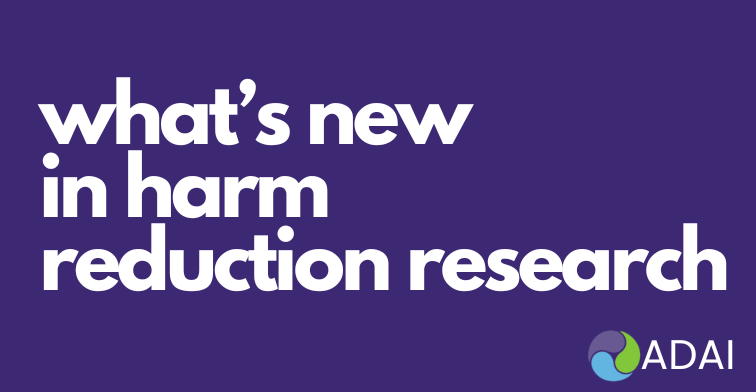What’s New in Harm Reduction Research
06/24/2024A review of recently published research on harm reduction topics – June 2024
Need help getting copies of any of these articles? Email Meg Brunner, MLIS (meganw@uw.edu). Free articles have “(open access)” after the titles; all other articles require a subscription to access.
FROM LOCAL AUTHORS

Irwin AN, Gray M, Ventricelli D, Boggis JS, Bratberg J, Floyd AS*, Silcox J, Hartung DM, Green TC. Res Social Adm Pharm 2024;20(5):512-519.
*Anthony Floyd, PhD – UW Addictions, Drug & Alcohol Institute
Results from focus groups with 32 community pharmacists across Washington, Oregon, Massachusetts, and New Hampshire that explored their attitudes, knowledge, and experiences in providing care for people with opioid use disorder (OUD). Themes include: 1) bias and stigma toward people with OUD, 2) familiarity and comfort providing naloxone, 3) attitude and practice shifts in selling nonprescription syringes, and 4) structural challenges to harm reduction care in the pharmacy.
SPECIAL FOCUS: EXPERIENCES OF HARM REDUCTION AND PEER WORKERS
“Everybody is impacted. Everybody’s hurting”: Grief, loss and the emotional impacts of overdose on harm reduction workers. (open access)
Kolla G, Khorasheh T, Dodd Z, Greig S, Altenberg J, Perreault Y, Bayoumi AM, Kenny KS. Int J Drug Policy 2024;127:104419.
Interviews with harm reduction workers in Toronto, Canada to explore the emotional impacts of witnessing and responding to escalating rates of overdose and other stressors within their work environment.
Experiences of peer work in drug use service settings: A systematic review of qualitative evidence.
Chen Y, Yuan Y, Reed BG. Int J Drug Policy 2023;120:104182. doi: 10.1016/j.drugpo.2023.104182. PMID: 37683570.
A systematic review of qualitative studies of the experiences of peer work in nonpeer-led drug use service settings. Themes include: the benefits of incorporating peers as a unique workforce, the challenges peers face, and the organizational factors that influence their practices.
Hill K, Dunham K, Grau LE, Heimer R. Harm Reduct J 2023;20(1):168.
Interviews with 17 harm reduction staff in Connecticut describing their role-related stressors navigating complex systems with a stigmatized population in an often-stigmatized field. Key supports include: positive relationships between clients and co-workers, supervisors who value their work, and organizational commitment to training, staffing, compensation, and benefits.
Schoenberger, S.F., Cummins, E.R., Carroll, J.J. et al. Harm Reduct J 2024;21: 66.
38 semi-structured interviews with post-overdose outreach program staff in Massachusetts who describe the emotional impact of regular and repeated exposure to others’ trauma and the presence or lack of self-care routines and social/workplace supports to address secondary trauma and compassion fatigue.
Changes in harm reduction service providers’ professional quality of life during dual public health emergencies in Canada. (open access)
Taha, S., King, S., Atif, S. et al. Harm Reduct J 21, 48 (2024).
A study on the emotional toll of the drug supply toxicity emergency and the Covid pandemic on harm reduction providers with focus on job satisfaction, burnout, secondary traumatic stress, and vulnerability to grief.
Harm reduction workforce, behavioral health, and service delivery in the USA: a cross-sectional study. (open access)
de Saxe Zerden L, Ware OD, Lombardi BN, Lombardi BM. Harm Reduct J. 2024;21(1):36.
Results from a national survey of 168 harm reduction workers at U.S.-based harm reduction organizations that sought to identify the types of roles in the harm reduction workforce, who provides behavioral health services within harm reduction organizations, and how behavioral health referrals are structured.
Need help getting copies of any of these articles?
Email Meg Brunner, MLIS, meganw@uw.edu.
Want to know when another post in this series is available? Subscribe to the ADAI blog and get all our posts sent right to your inbox!





